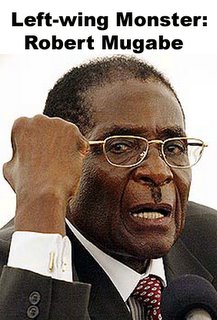Robert Mugabe...Tyranical Dictator of Zimbabwe
 Meet Robert Mugabe. If you're not familiar with him already, FrontPage Magazine will introduce you to Zimbabwe's tyrant "Dictator for Life"... click here.
Meet Robert Mugabe. If you're not familiar with him already, FrontPage Magazine will introduce you to Zimbabwe's tyrant "Dictator for Life"... click here.In comparison to Zimbabwe, neighboring Mozambique and Zambia, once the far poorer countries, now look wealthy. South Africa and Botswana, moderately successful by African standards, look like first-world countries. Zimbabwe is becoming the most benighted sub-Saharan nation, the heart of Africa's darkness and the soul of its shame. The death of this once-rich and thriving country has been the lifetime project of its Dictator for Life, Robert Mugabe.
Other countries, especially in Africa, suffer from despotism. But Mugabe's Zimbabwe is a special case. While he is as much a connoisseur of everyday brutality as other dictators, only Mugabe, along with his longstanding friend and supporter, North Korea's Kim Jong Il, has used famine in his quest to bring his people to heel and wipe out all opposition. As in the case of his North Korea brother in crime, he has made hunger a weapon. Over 4 million Zimbabweans--one third of the population--need food aid. The country is afflicted by with 70 percent unemployment, chronic fuel shortages, and triple-digit inflation. The World Bank has described Zimbabwe's economic situation as "unprecedented for a country not at war."
Zimbabwe is becoming the most
benighted sub-Saharan nation,
the heart of Africa's darkness
and the soul of its shame.
From the start, Mugabe was against the whites. He began by changing laws so as to deny citizenship to whites (always less than 5 percent of the population) such as the Salisbury-born former commander of Rhodesia's military, Gen. Peter Walls. Whites' guaranteed parliamentary seats were taken away, and their remaining MPs, including most prominently Ian Smith, were harassed, isolated, and sometimes denied passports. Following an interview with Ian Smith, in fact, this author was briefly detained in Harare in 1984 and expelled to South Africa. No credible explanations were given.
As long as the apartheid regime lasted in neighboring South Africa, Mugabe had to tread carefully, considering his country's reliance on South African trade and energy. But these constraints disappeared when majority rule came to Pretoria in 1994 where Mugabe’s abuses against whites are now tolerated, if not overtly encouraged.
The source of Mugabe's anti-white bigotry is not far to seek. About 4,000 white farmers, some whom had been established in the country for generations, produced the majority of the country's consumer foods and all its agricultural and industrial exports. White-owned farms were an attractive prey for his own family and political clique, as well as an opportunity for political demagoguery. By 2006 there were only 200 left, and those were literally under siege.
Beyond his longstanding racial animosity, Mugabe's main problem with whites is political and ideological. Politically, he has to satisfy his own Shona clique's desire for the land and wealth that had long been concentrated in white hands (althougth only a few of the confiscated farms were transferred to local peasants.) While "land reform" was the pretext for Mugabe’s move, the reality was that most farms were transferred to a parasitic clique around the president. Tens of thousands of black farm employees were left unemployed, and the state lost most of its tax and export revenues.
White-owned farms were
an attractive prey for his
own family and political clique
Ideologically, the whites initially represented "the bourgeoisie," Mugabe's equivalent of Stalin's "class enemies." He stated five years ago, "As a collectivity, they [white farmers] are a natural fissure and beachhead for the retention or re-launch of British and European influence and control over our body politic." That is also the reason why the assault against the whites went beyond the agribusiness domain. The regime has now begun confiscating and vandalizing white-owned property in Zimbabwe's cities. During Mugabe's earlier "Clean out the Filth" slum-clearing campaign, according to the UN, some 2.4 million people lost their housing. Many areas "cleared" were in fact prime real estate locations, ready for the regime's speculator sharks to take over for nothing.
In August 2002, Grace Mugabe, aided by the military, took over a 3,000-acre farm for her family, arresting the 78-year-old owner and dismissing the farm's black workers. Two of Mugabe's sisters, his brother-in-law, and his wife's nephew have also received farms. ZANU party members have burned millions of acres of crops and prevented many more acres from being farmed. As was the case with Stalin's creation of mass famine in the Ukraine in the 1930s, the burning of crops had a clear political goal: a hungry population is easier to control.
The confiscations, along with arbitrary currency manipulation, have led to astronomical rates of inflation--more than 500 percent in 2005--and a growing black market. Primary school enrollment has dropped precipitously, with Zimbabweans so poor that they cannot afford state school fees of $4 a term. Infant mortality has doubled while life expectancy fell from age 60 to 35. All this is after the regime drove some 3.4 million Zimbabweans, one quarter of the population, into exile, 1.2 million to South Africa alone, according to Harare's own figures. Today, Zimbabwe has no credit. Boeing has cut off supplies to Air Zimbabwe. Even China, Mugabe's old friend, avoids investments in the country.

Labels: Cox and Forkum, Military, UN



















-Home-